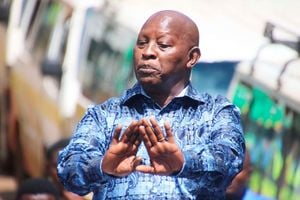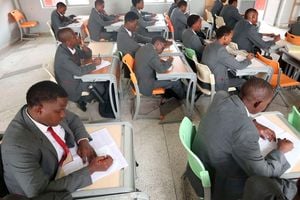Backing BBI to push for equality
What you need to know:
- Women leaders have intensified a push to achieve gender equality through the Building Bridges Initiative.
- They have met various political honchos including ODM leader Raila Odinga, Cotu boss Francis Atwoli, the latest being Kanu chairman Gideon Moi, who is also Baringo Senator.
- Homa Bay Woman Representative Gladys Wanga says they do not want the gains they made in the BBI report which President Kenyatta launched on November 27, 2019 abolished.
- Sources say they plan to meet more male leaders including Wiper’s Kalonzo Musyoka and Amani National Congress’ (ANC) Musalia Mudavadi.
Women leaders supporting President Uhuru Kenyatta and former Prime Minister Raila Odinga’s handshake have intensified a push to achieve gender equality through the Building Bridges Initiative (BBI).
As the country awaits the final BBI report to be handed over to the Head of State and the Orange Democratic Movement (ODM) boss, women leaders led by Kirinyaga Governor Anne Waiguru have met various political honchos, the latest being Kanu chairman Gideon Moi, who is also Baringo Senator.
The Nation has established that the group is also positioning itself to lead the BBI campaigns when the final report is unveiled in preparation for a possible constitutional review.
Those who spoke with the Nation last week maintained their firm stand for 50-50 gender representation in government positions as BBI moves on to the final stage.
BBI agenda
According to Homa Bay Woman Representative Gladys Wanga, they do not want the gains they made in the BBI report which President Kenyatta launched on November 27, 2019 abolished.
“We are lobbying for the inclusion of women issues in the BBI agenda, we want to attain the two-third gender rule, we are still looking for 50-50 of both gender in the Senate and the National Assembly,” said Ms Wanga, a close ally of the former Prime Minister.
“As women leaders of this country, we would like to ensure the gains we made in the BBI report are not eliminated, we are just hoping that as the BBI goes to the last stretch, women issues are included,” she added.
The second-time ODM legislator noted that there is an urgent need to do more if the country hopes to achieve gender inclusion in government institutions.
Ms Wanga told the Nation that more women should be involved in decision and policy making, and urged them to show interest in national politics through platforms such as those for public participation.
Cotu boss
In May, the group met Mr Odinga and three weeks ago, they held talks with Central Organisation Trade Union (Cotu) boss Francis Atwoli together with Jubilee Party vice-chairman David Murathe, with sources saying they plan to meet more male leaders including Wiper’s Kalonzo Musyoka and Amani National Congress’ (ANC) Musalia Mudavadi.
"BBI should also be about gender bridges... women leaders are seeking male allies and champions... Baba, Atwoli, Gideon... and we have plans to see more leaders," said one of the members of the group who did not want to be named.
"The women leaders are seeking to join the like-minded coalition on the BBI to protect and implement the gains of women in the 2010 Constitution, especially the two-thirds gender rule across all levels and sectors including both national and county levels, but particularly ensure the National Assembly and Senate are fully compliant," she added.
Critical role
Waiguru said they discussed the implementation through budgetary allocation and prioritisation, of Article 43.
"The women leaders are seeking a seat at the decision making table to pursue Article 43 Rights of Health, Water, Food Security, Education, Housing and Social Security. Women particularly want BBI to resolve health issues as women and families are suffering with weak health systems," the governor said when she addressed the press at Kabarak.
Those who attended the meeting include Nyeri Deputy Governor Caroline Karugu, Samburu West MP Naisula Lesuuda, former Nyeri Woman Rep Priscilla Nyokabi, Samburu Woman Rep Maison Leshomo, Wajir Woman Rep Fatuma Gedi, former Nairobi Speaker Beatrice Elachi, Kiambu Woman Rep Gathoni Wamuchomba, Mishi Mboko (Likoni) and Baringo Woman Rep Gladwell Cheruiyot.
Kanu Secretary General Nick Salat said the meeting revolved around how women leaders will play a critical role in promoting BBI among Kenyans.
Political landscape
Mr Salat added that the Sunday meeting resolved that the position of women in the country's political landscape can never be eroded.
"These was a group of like-minded leaders and as such, we were looking on what lies ahead so that we approach it from like-mindedness... BBI is coming as we chart way forward and how we will sell it to our people and how important it is," said Mr Salat.
He went ahead: "The role of women in our politics will never be the same after this BBI. There are those things which were included in the 2010 Constitution and if we cannot actualise them now, then we need to do so through BBI."
This comes after the push by the Law Society of Kenya (LSK) to have the National Assembly dissolved for failing to implement two-thirds gender rule gained momentum among politicians.
Deputy President William Ruto's allies have thrown their support behind the petition accusing Parliament of contravening the Constitution.
Meritocracy
Nandi Senator Samson Cherargei and Uasin Gishu Woman Representative Gladys Shollei said they fully support the dissolution of the National Assembly arguing that MPs are not above the law to not obey the laws of the land.
“Women rights are also rights, what a man can do, a woman can do better, and that is where the support is. Parliament is not above the law and that’s why I am supporting its dissolution,” said Senator Cherargei.
The lawmaker said women should be given positions on meritocracy and in accordance with the Constitution.
"We have seen how our women go to hotels to beg for positions which they ought to be given as enshrined in our Constitution and this unfair habit has to stop," he added.
Mr Cherargei, an ardent defender of the DP, accused the proponents of referendum through Building Bridges Initiative (BBI) that instead of pushing for full implementation of the 2010 Constitution they are busy calling for another one.
Current constitution
“The proponents of handshake and BBI are normally telling us that we must support the push for Constitutional change, why don’t they push for full implementation of the current Constitution first and then we can now go into the BBI and the referendum?” posed the Senator.
The LSK had asked Chief Justice David Maraga to write to President Kenyatta to advise him on dissolving Parliament on grounds that no laws have been crafted to enable implementation of Section 27 of the Constitution. The LSK petition says Parliament’s failure to craft the laws on gender balance is a violation of court orders.
Section 27 of the Constitution requires both levels of government to ensure neither gender has more than two-thirds of public officers, whether elected or appointed.
Dissolving Parliament would mean that Kenyans would return to the polls to vote in new representatives.
In 2012, the Supreme Court advised that the constitutional provisions on gender balance in government be implemented for the 2013 General Election.
Appeal dismissed
The High Court in 2017, ordered the National Assembly to craft laws that would enable implementation of the two-thirds gender rule. The court order followed a case filed by the Centre for Rights and Education and Awareness (Creaw).
The government appealed through the Attorney-General’s office. The Court of Appeal dismissed the Attorney-General’s case last April, and the LSK now says that Parliament has deliberately refused to initiate the gender balance process in government offices.
LSK President Nelson Havi argues that aside from failing to enact laws involving the two-thirds gender rule, Parliament itself is not balanced in regards to gender.
Under the two-thirds gender rule, the dominant gender should only occupy 66.6 per cent of public offices. Currently, men dominate the National Assembly as only 59 out of 349 MPs are female. This means that the 290 male MPs occupy 83 per cent of available seats.
In the Senate, the 47 male lawmakers account for 70 per cent of the available seats.





